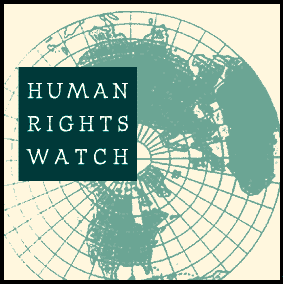"Charge or Free Ethnic Oromo Terrorism Suspects" (HRW to TPLF-led regime of the empire)
 Detainees Held Weeks Without Charge
Detainees Held Weeks Without Charge (New York, November 27, 2008) - The Ethiopian government should immediately free 53 ethnic Oromos arrested several weeks ago on allegations of support for terrorism if it cannot credibly charge them, Human Rights Watch said today. Human Rights Watch said that a court should not grant further police requests to extend their detention without charge past a December 1, 2008, deadline, in part because of serious risks of torture.
Ethiopian authorities have arrested more than 100 ethnic Oromo Ethiopians since October 30 in Addis Ababa and across Ethiopia's Oromia region, and 53 remain in detention without charge in Addis Ababa. The government claims they were helping plot terrorist attacks on behalf of the outlawed Oromo Liberation Front (OLF), that they were funding the rebel group or committing other, as yet unspecified crimes linked to terrorism or rebel activity.
"Ethiopia has well-founded fears of terrorist attacks, but has often manipulated those fears to suppress dissent," said Georgette Gagnon, Africa director at Human Rights Watch. "These mass arrests bear all the hallmarks of the ‘imprison first, investigate later' tactics used to arbitrarily detain peaceful critics.''
While Ethiopia has valid security concerns related to bombings and other attacks, the government has routinely cited terrorism as a pretext for suppressing nonviolent opposition and arbitrarily detaining peaceful government critics. Over the years, Ethiopia's government has regularly used accusations of support for the Oromo rebels, who have been carrying out a low-level insurgency for a decade, as a pretext for cracking down on political dissent among the Oromo population.
Those arrested include Bekele Jirata, secretary general of the Oromo Federalist Democratic Movement, an opposition political party with seats in Parliament; three human rights activists working for the Ethiopian Human Rights Council in the town of Nekemte (since released); teachers and university lecturers; and several prominent businessmen and hotel owners. At their last court appearance, some of the detainees said that they had been taken from their cells at night and tortured. Torture has been a routine practice at Addis Ababa's Maikelawi, or Central Investigation Unit, where the detainees are being held.
The Ethiopian government blames the Oromo rebels for numerous grenade and bomb attacks in Addis Ababa and elsewhere in recent years. A public statement by police and intelligence officials on November 22 accused legal opposition parties of harboring terrorists bent on "dismantling the national constitution" within their ranks.
The recent arrests coincide with a massive security deployment in Addis Ababa that took place in response to bombings on October 29. The Ethiopian trade mission in Hargeisa, Somaliland was hit by a suicide bomb attack that claimed at least four Ethiopian civilian lives. It was one of several near-simultaneous attacks in Hargeisa and the semi-autonomous region of Puntland in Somalia that killed at least 25 people, mainly Somali civilians. The attacks may have been carried out, though, by insurgents from Somalia, where the Ethiopian military has been engaged in support of the transitional government since December 2006.
Past arrests of ethnic Oromos have targeted people from all walks of life, including political figures, teenage students, teachers, and civil society activists. In November, the government pardoned and released 44 people convicted of crimes linked to the rebels who had been in prison for long terms. Some had originally been sentenced to life in prison or death.
As Human Rights Watch has documented, governance in Oromia has long been marked by widespread acts of intimidation, arbitrary arrest, torture and other serious human rights abuses targeting people who criticize the government. Many of those targeted for abuses have done nothing more than to criticize local officials or participate in student protests.
Police investigators have not charged any of the recent detainees with a criminal offense. Courts have ordered some detainees released after police failed to provide any legal basis to justify their detention. Five detainees were released in Addis Ababa along with others who were detained in Nekemte, Dembi Dollo and other parts of Oromia. But 53 remain in custody in Addis Ababa after police officials obtained a court order to allow them to keep the detainees in custody for two weeks while they gathered evidence against them. When the two-week deadline expired on November 24, the police returned to court empty-handed but obtained a one-week extension, until December 1, to find evidence that might substantiate criminal charges.
This pattern of prolonged detention without charge is routine practice in cases of Oromo Ethiopians arrested on accusations of terrorism or of supporting the rebels. Ethiopian courts often eventually reject police requests for continued detention and order those held to be released - but only after they have spent weeks or months in detention while police claim to look for evidence that could justify their being charged.
"Ethiopian judges deserve praise when they stand up to order the release of people detained without legal basis," Gagnon said. "But often this only happens after detainees have already been held without charge for punitive lengths of time."
Oromia is Ethiopia's largest and most populous region. Its regional government is controlled by the Oromo People's Democratic Organization (OPDO), a member of the ruling Ethiopian People's Revolutionary Democratic Front (EPRDF).
The Oromo Liberation Front fought alongside the governing party in the struggle to overthrow the Derg dictatorship, but after the war the two organizations fell out with one another. The OLF was outlawed and its leadership driven from the country. It is now based in Asmara, Eritrea. Relations between Ethiopia and Eritrea have been poisonous since the two countries fought a bloody border war in 1998-1999 that claimed tens of thousands of lives. The border issue remains unresolved.
Human Rights Watch
0 Comments:
Post a Comment
Subscribe to Post Comments [Atom]
<< Home